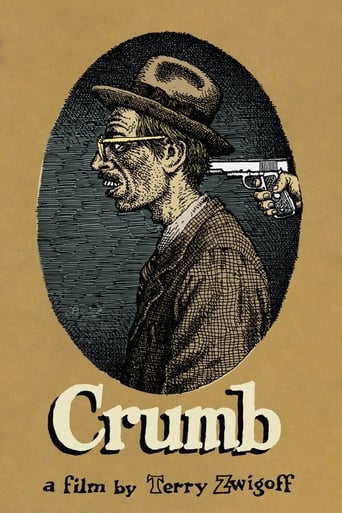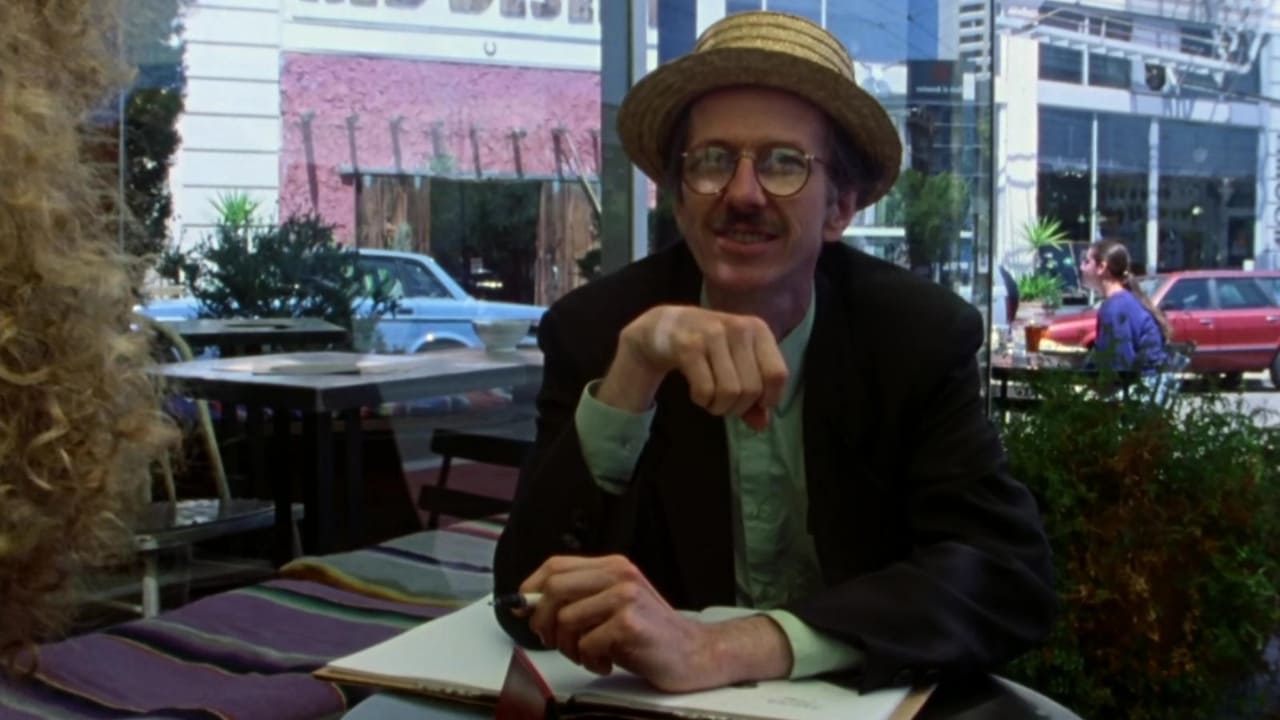eroscow-05581
Crumb is a documentary explaining the events that led artist Robert Crumb to create the comics he did. The whole family seems to have incredibly weird personalities and views toward sex.Robert's brother, Maxon, practices celibacy as sex triggers seizures for him. His other brother, Charles, has never had sex and is a recluse who lived with their mother up until his suicide. Robert himself is promiscuous and has feet and cartoon (especially to do with cartoons he has made) fetishes. Only a small amount of detail as to why all of these boys are so sexually inhibited is revealed. You do learn about their upbringing but not enough information is revealed to fully gauge why they ended up how they did. Some may disagree with that but I found that more backstory as to their upbringing would've provided greater insight into their situations.I mostly found this documentary extremely depressing. Robert himself says he lacks the ability to love anyone and the only person he loves is his daughter, Sophie. He doesn't mention feeling love for his son, Jesse, who seems a little heartbroken that he can't become closer with his father. Charles (at the time of recording before committing suicide) was on medication to deal with his mental problems. He goes into immense detail about his inability to feel connected to other people. Maxon seems just as strange as he swallows what I believe were pieces of cloth which he would digest in order to "clean out his insides". He also went into detail about pulling women's shorts down in public places and walking in on a woman who was naked in the bathroom, subsequently falling on the bathroom floor and having a seizure after looking at her.This documentary is fascinating, depressing, and leaves you asking more questions after finishing it. Definitely not a movie for a prudish person. But if this sounds interesting to you and you'd like to learn more I recommend you watch this movie.
peefyn
This movie could not have been called R. Crumb, because while the movie (indirectly) explores the themes and origins of his art, it is just as much about his troubled family, and how they all ended up where they are.R. Crumb himself seems like a dork that has grown successful and found happiness in that - but at the same time resents all the things that made him a dork in the first place. His obvious love and admiration for his brothers is obvious, but tainted by the reality of their situations."Oh geez" is Crumb's (comic-like) reaction to some of the more horrible stuff his brothers talk about, and he does not reflect over what they are saying (on film). The movie is a honest depiction of Crumb in the sense that he (and people around him) openly talk about his strange (and sometimes scary) sides - but the movie never gets personal for him. Only for his brothers.That said, the documentary does not point to his brothers and say "This is the explanation for Crumb's art". It does not simplify his art, even though some of the people commenting on it in the documentary are clearly trying to. It takes you on a journey through the themes of his art in a way that feels fluid, but that is really done point for point.And that is why this documentary work so well. You feel like you are just following this character, but you are actually being taken into a carefully curated commentary on his work.
gavin6942
A cinematic portrait of the controversial comic book writer/artist and his traumatized family.Crumb is the perfect subject matter for Terry Zwigoff, who is best known for "Ghost World", an adaptation of a graphic novel. Zwigoff clearly has an interest in independent comics and knows how to present them in a way that makes them interesting and accessible to people. Some of "Ghost World"'s biggest fans have never read a comic book, and I suspect one need not know who Crumb is to appreciate this documentary.His brother Charles lives in a "cloistered environment" of books, which is an interesting sight... he speaks of not yet having read Kant or Hegel, but you can see nearby a copy of a Buddhist book, suggesting that such things may not be beyond his range of interests. What Charles does now is unclear. Presumably nothing. And the other brother, Maxon, is even more bizarre.The constant cynicism is a welcome perspective. He seems happy, but Crumb constantly talks disparagingly of things. His attitude is interesting, and sometimes he suggests a Luddite viewpoint. He also, despite needing money, turned down Saturday Night Live and the Rolling Stones... running from fame.A gallery owner calls him the "Daumier of our time" and the Time art critic says he is the Brueghel for the second half of the 20th century. I suppose being compared to classic art is a compliment, though the fact they are such obscure names may not be complimentary at all... I do not know Daumier or Brueghel's work, so I cannot even say if I like it! If Crumb is not weird enough, just wait until they invite him behind the scenes at a pornographic "Leg Show" photo shoot.
steve freeman
"Crumb" is an amazing documentary about an extraordinary artist. Most great movies are great because they carry kernels of truth: Fellini on sexual desire and repression, The Godfather on the vagaries of morality and business, Casablanca of things bigger than ourselves, the great (anti)war movies on how politicians and generals coldly manipulate young men and ultimately murder them, etc., etc... But the classics are stylized accounts with kernels of truth. "Crumb," in contrast, is truth through and through uncompromisingly laid open. You don't realize how rare truth is until you finally see it.Crumb's own oeuvre is a study in truth, inhabited by a menagerie of characters that haunt his subconscious: rigid "White Man," farcical hippie guru Mr. Natural, Amazonian Angel McSpade, the subhumans who beat up his brother as adolescents, and his own self-pitying self.When he became a counter culture hero, Crumb promptly put the would-be worshipers at arm's length with his openly "perverse" sexual comics. He lampooned America and its critics alike, though "lampoon" isn't quite the right word, for his powerful critiques are frequently wordless, midnight black humor, if it's humor at all (see, for example, his History of America at www.zubeworld.com/crumbmuseum/history1.html). He drew what he felt and never sold-out, even turning down a commission to draw a Rolling Stones album cover because he didn't think much of their music. During the filming of the movie, he and his wife are moving to the south of France because America has become just too ugly, commercial and crass.Interviewed in the film, he and his brothers acknowledge being unpopular wimps, abused by their father and many of their peers. Underlying the truth in his work lay the truth of his life and family, exposed with embarrassing candor. His older brother and mother never leave their small, poor home, though they have nothing in common so they just maintain an uneasy truce. His younger brother lives as a monk, drawing a long linen tape through his body to clean his intestines while sitting on a bed of nails. Neither brother has ever had sex.Crumb, it's clear, loves them, and it's a painful, poignant love because he's also detached. What can he do after all, except accept them? His work too, is poignantly portrayed: at one point he sits semi-autistic listening to soulful old records (he's a collector), with a slow panning over a collage of haunting illustrations.Crumb is routinely referred to as a pervert. And of course his family is deeply disturbed. But so is much of America. And so is much of the world. Psychiatrist Alfred Adler observed that "The only normal people are the ones you don't know very well." So of course Crumb is not normal. He has allowed us to know him.


 AD
AD

